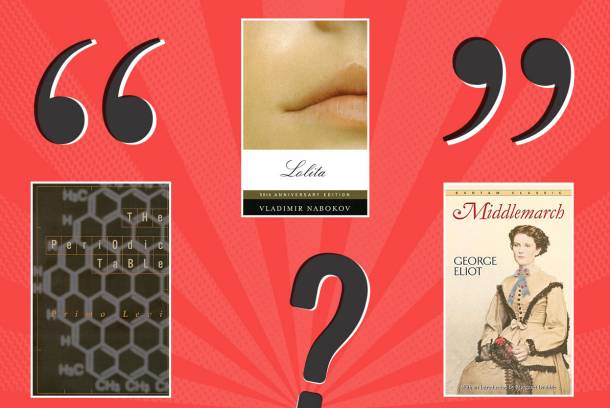If you often get so persnickety about the proper punctuation mark to use, your choice might just prove well worth the effort. Who knows, your choice might be so felicitous as to get rated among the most remarkable uses of punctuation marks in English literature.
 FROM NEWYORKMAG.COM
FROM NEWYORKMAG.COMIn “The 5 Best Punctuation Marks in Literature,” an article that came out in the January 17, 2014 issue of
Vulture.com, American journalist and writer Kathryn Schulz has listed what she purports to be the most extraordinary examples she could find of punctuation usage in literary work: (1) Vladimir Nabokov’s “swift, staggering, and brilliant” parenthetical in
Lolita; (2) George Eliot’s brazen use of the em-dash to disrupt the narrative flow in
Middlemarch; (3) T.S. Eliot’s use of a meandering, existential ellipses in his poem “The Love Song of J. Alfred Prufrock”; (4) Charles Dickens’s wandering colon that “insanely” but fittingly breaks the opening line of his novel
The Christmas Carol; and (5) Primo Levi’s use of a final, atomlike dot as a period to end his memoir that’s aptly titled
The Periodic Table.
Check out the five now and see if your work so far has used punctuation that you feel deserves inclusion in the Schulz collection.
Read Kathryn Schultz’s “The 5 Best Punctuation Marks in Literature” in Vulture.com now!ANOTHER INTERESTING READING:In “Brain uses ‘acoustic signatures’ to understand language,” an article that came out in the January 31, 2014 issue of
Health24.com, it is reported that new research into human understanding of language suggests that the brain comprehends speech by picking up on certain kinds of sounds – so-called acoustic signatures. The researchers found that parts of the brain are tuned in to general acoustic signatures instead of specific speech sounds like those made by the letters B or Z. Says study senior author Dr Edward Chang, neurosurgeon and neuroscientist at the University of California, San Francisco: “By studying all of the speech sounds in English, we found that the brain has a systematic organization for basic sound feature units, kind of like elements in the periodic table.”
Read “Brain uses ‘acoustic signatures’ to understand language” in Health24.com now!